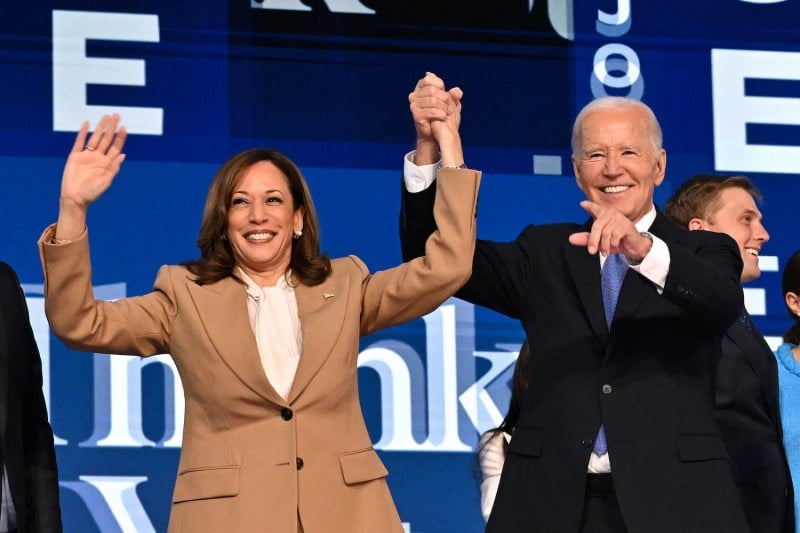Summary by Geopolist | Istanbul Center for Geopolitics
As Kamala Harris prepares for the forthcoming presidential election, the article examines her economic and foreign policy strategies. Harris is indicating a strong adherence to the policies of the Biden administration, particularly in the area of economic strategy, which is frequently referred to as “Bidenomics.” The approach has been distinguished by substantial public investment and initiatives to combat economic inequality. However, it is anticipated that Harris’s foreign policy stance will largely align with Biden’s, with a few potential exceptions, particularly in relation to the Gaza situation.
Harris’s candidacy has invigorated the Democratic base, resulting in a significant increase in enthusiasm among Democrat and Democrat-leaning voters. The election outcome is anticipated to be significantly influenced by voter turnout, making this surge in support necessary. In spite of this enthusiasm, the election remains competitive, with Harris maintaining a slight advantage in numerous polls. The article emphasizes the necessity of maintaining this momentum in order to achieve victory in the forthcoming election.
Harris’s potential presidency is being intently monitored on the international stage. Her speeches and interviews indicate that, despite the possibility of some modifications, particularly in regions such as Gaza, the general orientation of foreign policy will remain in accordance with Biden’s. This continuity is perceived as both an asset and a challenge, as Harris will be required to navigate the intricate global landscape while simultaneously addressing domestic concerns.
Read the full article below.
Harris is signalling continuity on Bidenomics – and, for now, on foreign policy
On matters of foreign policy, the US president’s powers are considerable. Scholars and pundits note that the power of US presidents has been ‘relentlessly increasing over decades’. This is especially true when it comes to matters of war and peace.
US presidents have access to unparalleled military and economic statecraft that gives them the potential to exert considerable influence on other states by using, or threatening to use, economic sanctions or military force. Even US allies are wary that they could become the target of secondary sanctions. The threat to withhold US military or economic assistance can also be very powerful in certain situations.
Given this enormous power, and the fact that Donald Trump and Kamala Harris have radically different world views, the election matters, a lot, for foreign policy: the rest of the world is on tenterhooks. RELATED CONTENTIndependent Thinking: What would a Harris presidency mean for the world?
The messages Harris has provided so far, at the Democratic National Convention (DNC) and during her CNN interview, suggest that her presidency would promise a large measure of continuity from the Biden administration’s foreign and economic policy.
But she will come under pressure on both counts. Bidenomics continues to divide the US public. And on foreign policy, Biden has been framed by Republicans as a president who will leave office with two major wars raging.
The one area where Harris may wish to take a different approach is Gaza. But the pressure to tread a careful line will be immense: the war is the one area that could yet threaten Harris’s powerful new status.
Politics are anything but normal
The presidential race (for now) appears to be in a dead heat, with Harris a few points in the lead in many polls – though a majority of Americans remain locked in their respective camps.
In this context, voter turnout matters a lot and may determine the result of the election. For Democrats, that means a renewed sense of ‘enthusiasm’ is crucial to success.
The party’s convention last week showcased exactly the transformation in mood the party required. After months of disaffection among voters, Harris’s candidacy has energized voters. 78 per cent of Democrat and Democrat leaning voters are now ‘more enthusiastic than usual’, up from 55 per cent in March.
Their enthusiasm has surpassed the 64 per cent of Republican voters who are also more enthusiastic today. Democrats’ enthusiasm is reflected in donations, with the Harris-Walz campaign raising more than $540 million since its launch.
Harris’ message of joy and hope combines pragmatism (‘do something’) with a set of policies targeted at making daily life affordable for working Americans. All of this is underwritten by realistic expectations, in the words of President Obama, to ‘never underestimate your adversary’.
Republicans are rapidly adjusting. After doubling down on their appeals to conservative, traditional, white working class, and especially male, voters, former president Trump is now announcing policies that may appeal beyond his base, including to make fertility treatments affordable to ordinary Americans.
Economic policy for the middle class
Trump has already begun attacking Harris, framing her as a communist. This may be effective with some voters, but these polarizing methods threaten to displace what is deeply needed: a serious policy debate about the role of government intervention in the economy.
Both campaigns are targeting middle class (read: working class) Americans, addressing a real need to invest in better daily conditions for ordinary Americans. For Harris, this means more affordable housing, child benefit policies, and lowered medical costs.
Harris would continue Biden’s policy of using tariffs selectively, for example on imports of semiconductor chips.
Among policy experts, Republicans, and even among Democrats, there is discomfort with Bidenomics. Yet a Harris presidency looks like it would continue to embrace the president’s approach.
Harris has been strongly averse to Trump’s proposed tariffs (of between 10 and 20 per cent on most imports, and over 60 per cent on Chinese goods) which she and most economists acknowledge risks effectively becoming a tax on consumers. Instead, Harris would continue Biden’s policy of using tariffs selectively, for example on imports of semiconductor chips.
Some are calling on Harris to further distance her economic platform from Trump’s by promising two pro-growth policies: reform of the US’s legal immigration system and expansion of free trade deals.
Policies to rebuild the middle class will help to mitigate the fear that divides Americans and feeds the demonization of immigrants. But such policies are a hard sell in the US.
51 per cent of Americans say they would rather have smaller government providing fewer services, reflecting party divisions: a June poll revealed that 79 per cent of Trump voters want a smaller role for government, and 74 per cent of Biden’s voters want a larger role.
Foreign policy
For the rest of the world, the US’s next steps on foreign policy are a major preoccupation. Harris’s speech at the convention, and her CNN interview have offered a few clues. So far, most signs indicate that there will be more continuity than change between Biden and Harris on foreign policy.
MAGA Republicans believe the US must focus on China, and that Europe needs to take care of its own security. JD Vance has confirmed this position, and provided an intellectual underpinning for it. RELATED CONTENTKamala Harris would bring greater foreign policy experience than most new US presidents
In contrast, in her convention speech Harris premised US leadership on its values and like Biden embraced US allies and partners.
In her CNN interview, Harris also stressed her role prosecuting transnational criminal organizations, suggesting that law will take pride of place in her administration. One question that remains unanswered is how she will balance the US’s fierce embrace of its sovereignty with the interventions of international legal institutions like the International Criminal Court.
Harris has been robust in her support both for Ukraine and for NATO. On China, she made clear at the convention that she will ensure that the ‘US not China wins the competition’ for the 21st Century.’
She was also adamant that under her leadership, the US would not cozy up to dictators like Kim Jong Un and Vladimir Putin. Perhaps most stunning was her statement that ‘As commander-in-chief, I will ensure America always has the strongest, most lethal fighting force in the world’.
However, some daylight has emerged between Biden and Harris. At the convention Harris avoided the stark framing of international politics as one between autocracies and democracies.
On Israel and Palestine, she spoke emotively about the suffering of the Palestinian people, while carefully articulating Israel’s right to defend itself and speaking passionately about the suffering of the hostages and the 7 October attacks.
Can Harris stake out a different policy from Biden, as peace talks between Israel and Hamas continue to stall, and those voters for whom Gaza is a decisive factor demand change in US policy?
This is a policy area that will be watched carefully in the weeks ahead: can Harris stake out a different policy from Biden, as peace talks between Israel and Hamas continue to stall, and those voters for whom Gaza is a decisive factor demand change in US policy?
The days ahead will not be campaign business as usual. Never before in modern US history has a candidate had so little time to establish herself. The 10 September presidential debate will be a test of Harris’s ability to counter Trump’s lies and diversions in real time, while communicating who she is to the American people.
By: Dr Leslie Vinjamuri
Source: Chatham House







